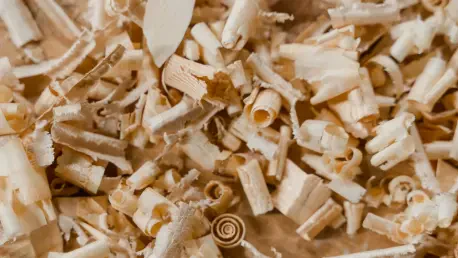In the bustling town of Ubá, Brazil, known for its vibrant furniture industry, a significant yet often overlooked challenge presents itself: the vast amount of wood waste production. As Brazil increasingly embraces sustainable practices, the opportunity to transform this waste into valuable, eco-friendly construction materials emerges. The furniture sector in Ubá generates substantial wood waste, primarily chips and sawdust, which remain largely unmanaged. In recent years, this waste has equated to 9.0% of the total raw materials used by the industry, highlighting its considerable potential for recycling and reuse in sustainable construction projects. As such, this resource presents not only a challenge but also a groundbreaking opportunity for Brazil to lead in green construction innovation.
Unveiling the Wealth of Wood Waste
Current Wood Waste Production
With the furniture industry booming, the volume of wood waste generated has reached unprecedented levels. The analysis of 17 furniture companies in Ubá shows that substantial quantities of wood are consumed, with more than 600,000 kg of solid wood and over 9 million kg of panels, primarily made of eucalyptus and pine. This production inevitably results in a significant amount of waste, comprising chips and sawdust. Approximately 51.77% constitutes chips, while 48.23% is sawdust. Such considerable amounts demonstrate an urgent need for effective waste management strategies that could turn potential pollutants into profitable commodities. By harnessing these residues, the industry can create recycled panels, composite materials, and other innovative solutions.
Prospects for Sustainable Construction
The ability to repurpose wood waste into various environmentally friendly building materials brings about exciting prospects for sustainable construction. Emerging technologies now permit the conversion of wood waste into eco-efficient products like woodcrete, bio-based insulation materials, and lightweight composites. These materials not only reduce the reliance on virgin materials but also contribute to the circular economy—an economic system aimed at minimizing waste and making the most of resources. By embracing such practices, Ubá can lead by example in environmental stewardship, demonstrating that waste is not merely a byproduct to be discarded but instead a valuable resource for sustainable growth.
Driving Forces Behind the Green Shift
Economic and Environmental Benefits
The incorporation of wood waste into the construction sector yields both economic and environmental advantages. Economically, transforming waste into construction materials can stimulate the local economy by creating job opportunities and reducing costs associated with raw material production. This economic boost, alongside the reduced environmental footprint, offers a double incentive for industries and policymakers to invest in sustainable practices. Environmentally, utilizing wood waste mitigates its impact as a pollutant and reduces deforestation by requiring fewer resources for building materials. This shift to eco-efficient solutions is crucial for the conservation of natural resources, aligning Brazil’s construction industry with global sustainability trends.
Challenges to Implementation
While the prospects are enticing, practical challenges exist in making wood waste recycling mainstream in Brazil’s construction industry. This requires significant investment in technology to ensure efficient recycling processes and the development of a supportive regulatory framework to incentivize companies to adopt these practices. Such policies must address barriers like initial costs and technological gaps that could hinder widespread adoption. Furthermore, educating manufacturers and builders on the benefits of using recycled materials will be vital in cultivating an industry-wide acceptance essential for long-term success.
A Path Toward Sustainable Growth
Setting the Stage for Future Innovation
With recent efforts to integrate wood waste recycling into Ubá’s construction sector, Brazil is poised to pave the way for innovative solutions that enhance sustainability. By studying this model, other regions are encouraged to explore waste-derived products that uphold the values of resource efficiency and environmental responsibility. Continued research and collaboration between industry leaders and policymakers can drive these efforts, setting the stage for advancements that further incorporate eco-friendly materials into construction practices. As Brazil leads these initiatives, the lessons learned and technologies developed will serve as benchmarks for global sustainability in construction.
Concluding Thoughts: The Future of Construction in Brazil
The rapid growth of the furniture industry has led to an unprecedented increase in wood waste. A detailed review of 17 furniture companies in Ubá reveals they use substantial amounts of wood, consuming more than 600,000 kilograms of solid wood and over 9 million kilograms of panels, mostly from eucalyptus and pine. This process inevitably produces a significant amount of waste, mainly in the form of chips and sawdust. Approximately 51.77% of this waste is chips, while 48.23% is sawdust. These large quantities highlight a pressing need for efficient waste management strategies that can transform potential pollutants into valuable resources. By effectively utilizing these wood residues, the industry has the opportunity to develop recycled panels, composite materials, and innovative products. Implementing such strategies not only addresses environmental concerns but can also lead to increased profitability for the industry, turning waste into an asset and reducing the ecological footprint of furniture production.









